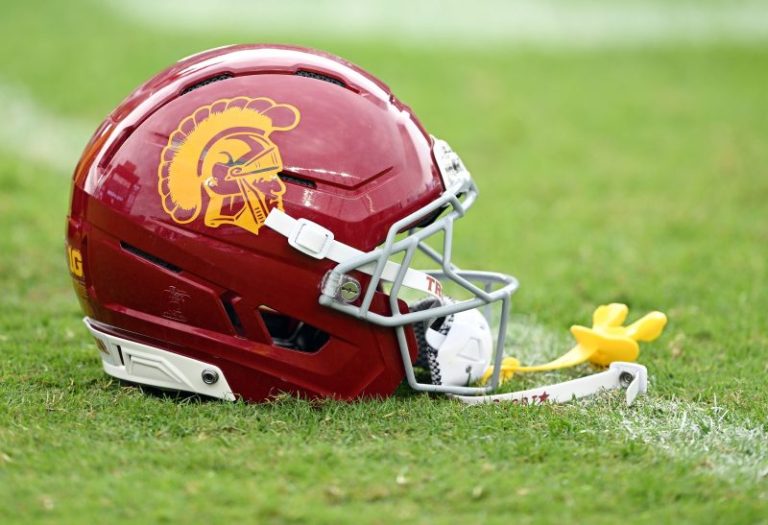It was the Jonathan Taylor show in Germany, as the Indianapolis Colts outlasted the Atlanta Falcons in overtime in the NFL’s first-ever game in Berlin.
Taylor showed up and showed out for the international crowd, tallying a monstrous 244 yards and three touchdowns in the win to push the Colts to their eighth win on the season and the AFC’s No. 1 seed.
The Colts will go as their superstar running back goes, especially if Daniel Jones plays as he did on Sunday: The quarterback fumbled three times (one lost) and threw an interception in the loss, making it clear that the Indy offense runs through the running back.
On the other side, the Falcons may regret not running Bijan Robinson more. Michael Penix Jr. was under duress throughout the afternoon, but Atlanta confusingly did not turn to the running game more as the offensive line failed to protect Penix appropriately.
The OT loss sent the Falcons to their fourth straight, while they cling to any semblance of hope for an NFC South title.
USA TODAY Sports provided live updates, highlights and more from the next installment of the NFL’s international series below. All times are Eastern.
Colts vs Falcons takeaways
JT for MVP: If there was any doubt that the Colts running back is a front-runner for MVP, then that went out the window with his dazzling performance on Sunday. It’s becoming increasingly clear that the offense moves as Taylor does: With Daniel Jones producing diminishing returns in recent weeks, the Colts will need to ride the Taylor wave to the AFC South crown – and he’ll be at the top of MVP ballots if they finish the job.
Where did you go, Mr. Robinson? The Falcons seeming hesitance to utilize Bijan Robinson in the second half was confusing at best and malpractice at worst. Robinson carried it just two times in the third quarter, a stark difference from the Colts, who leaned heavily on Jonathan Taylor in the second half to keep the offense running. The Falcons seem very disjointed when it comes to their offensive play-calling – something that needs to get figured out fast as their season spirals.
Keeping up with the Jones: Daniel Jones certainly hasn’t looked like the Daniel Jones of the early goings of the season. Jones did throw a 37-yard touchdown to Alec Pierce, but he looked hesitant in the pocket and his sacks and turnovers were more of a result of his indecisiveness and desire to make a play than Falcons defense coming up big. With a killer schedule the remainder of the season, if the Colts want to put away the AFC South, they’ll need the Jones of old.
Penix under pressure: Michael Penix is at his best when he can stand in the pocket and deliver strikes, a luxury he wasn’t afforded much during the matchup. He was sacked three times and on the run throughout the afternoon. Keeping with the above point, the Falcons would be wise to continue to lean on the run game to help their passer while the chemistry with Drake London continues to develop.
Colts vs Falcons in Berlin: Score, highlights, stats
Jonathan Taylor stats today
The Colts running back finished the matchup with 244 yards and three touchdowns in the game, including the game-ending score vs. the Falcons.
Jonathan Taylor secures win with OT touchdown
It was all Jonathan Taylor, all day, and he walked it off on the Falcons with an untouched touchdown run from eight yards out. That gives the Colts the win and the Falcons a frustrating loss.
Coin toss confusion ahead of Falcons-Colts overtime
Referee Clete Blakeman went through the rules and regulations of overtime before asking the Colts what their choice was – but it wasn’t their choice to make. Since the Falcons are the designated road team in this matchup, they had the right to call the coin flip, not the Colts.
During the commercial break, the coin was re-flipped, and the Falcons won, leading to Atlanta receiving the overtime kick.
Intentional grounding confusion leads ahead of overtime
Michael Penix was flagged for intentional grounding with 11 seconds left, but referee Clete Blakeman deemed the game was over. Ultimately, penalty was accepted and Atlanta declined to use a timeout, letting the clock run out and head to overtime.
Colts-Falcons score: Indy ties it up with field goal
Daniel Jones was under pressure on the drive, but the Colts found a way to convert a fourth down and later kick a 44-yard Michael Badgley field goal to tie the game with 26 seconds left.
Colts 25, Falcons 25
Colts convert critical fourth down
The Colts found themselves in a third-and-21, and Daniel Jones picked up a big chunk of that with his legs. On the following fourth down, Jones found rookie tight end Tyler Warren for the first down.
Colts-Falcons score: Tyler Allgeier finds the end zone
The Falcons marched methodically down the field and Tyler Allgeier found the end zone for the second time on the day to take the lead. Atlanta’s 2-point conversion was successful after Sauce Gardner fell down on a Drake London route.
Falcons 25, Colts 22
2-minute warning: Falcons threatening
The Falcons have the ball with two minutes left in regulation on the Colts’ 19-yard line. It’s been a healthy dose of Tyler Allgeier on the drive, who has made the most of his carries.
Colts-Falcons score: Jonathan Taylor breaks free for long TD run
Jonathan Taylor looked like he was stopped for a short gain, but instead taking it to the house for an 83-yard touchdown run. Indy’s 2-point conversion attempt would be batted down at the line, meaning it’s a five-point game with six minutes remaining.
Score: Colts 22, Falcons 17
Falcons offense again stalls out in fourth quarter
Atlanta again got 18 yards rushing from Bijan Robinson and then decided to throw several times, the last an incomplete pass on third down to give the ball back to the Colts via punt.
Colts-Falcons score: Indianapolis cuts the lead to one point
The Colts again found themselves deep in Atlanta territory, but a third down sack of Daniel Jones led to a field goal attempt. The Badgely kick sailed through the uprights, cutting the lead to one with nine minutes remaining.
Score: Falcons 17, Colts 16
Bijan Robinson stats vs. Colts
The Falcons running back has had an efficient game, carrying the ball 12 times for 63 yards (5.3 YPC). He had just two carries in the third quarter, one of a which was a 10-yard run.
Colts-Falcons score: Falcons lead entering fourth quarter
The Falcons defense has done well to bottle up the Colts offense after a torrid first quarter. The Colts haven’t scored since that first quarter, while the Falcons offense has sputtered, as well. Falcons are up 17-13.
Colts again fail to convert fourth down
From the Falcons’ 6-yard line, the Colts needed two yards to convert and set up for a fresh goal-to-go situation. Instead, Atlanta’s defense stands up and holds Jonathan Taylor behind the line of scrimmage to stop the Colts on fourth down.
Sauce Gardner drops interception
The Colts big-time deadline addition had an opportunity to make a big-time play. Gardner read Penix’s eyes and darted up field to grab an INT, but the ball bounced off his chest and landed harmlessly to the ground. The PBU ended the Falcons’ chance to lengthen their lead off the Jones fumble.
Daniel Jones turns it over again, Falcons take over
The Colts had an opportunity to tighten the gap but instead a Daniel Jones strip sack gives the ball back to Atlanta in the third quarter. It’s the second turnover on the day for Jones.
Ashton Dulin sets up Colts with big return
The Colts return man put Indianapolis in good position to answer with a 50-yard return. Indianapolis looks to answer again.
Colts-Falcons score: Zane Gonzalez adds FG to Atlanta lead
Zane Gonzalez, making his kicking debut for the Falcons, drills a field goal to lengthen Atlanta’s lead to four points. The kick came a play after Penix couldn’t connect with Pitts in the end zone.
Score: Falcons 17, Colts 13
Falcons receive second-half kickoff
Looking to build on their momentum at the end of the first half, the Falcons receive the second-half kickoff and look to build on their one-poin lead.
Daniel Jones throws interception late in second
The Colts seemed relatively content to let time tick down in the half and set themselves up for a lengthy field goal try, but a Daniel Jones pass landed in the hands of Jessie Bates, and the Falcons would let the remaining eight seconds run out on the ensuing offensive possession.
Colts-Falcons score: Drake London secures catch for TD
It truly is an international affair in Berlin, at least according to the Falcons WR’s last name. London hauled in a Michael Penix Jr. throw to put the Falcons back into the lead with time ticking down in the first half.
Score: Falcons 14, Colts 13
Michael Badgley kick comes up short
The Colts kicker can add a missed field goal to his missed extra point today. A 53-yard field goal came up just short of the uprights, keeping the Colts’ lead to six points.
Colts lead Falcons at end of first quarter
The Colts and Falcons exchanged punches in the first quarter, but Indianapolis emerged from the period ahead and with possession of the ball. The second quarter starts with the Colts driving in their own territory.
Colts-Falcons score: Daniel Jones finds Alec Pierce for long TD
Danny Dimes lived up to his nickname on a 37-yard bomb to Alec Pierce. The passer found Pierce in the end zone for a long touchdown, again quickly answering the Falcons score to retake the lead.
Score: Colts 13, Falcons 7
Colts-Falcons score: Falcons answer quickly
It didn’t take long at all for the Falcons to answer. Atlanta marched down the field and Tyler Allgeier punched it in for a touchdown. The Falcons take a one-point lead.
Score: Falcons 7, Colts 6
Colts-Falcons score: Jonathan Taylor finds pay dirt for 6
It didn’t take long for the Colts to score following the fumble: Jonathan Taylor scored his 13th rushing touchdown of the season a few plays later. The extra point try would sail wide of the uprights, leading to six points instead of seven.
Score: Colts 6, Falcons 0
Michael Penix Jr. sacked, fumbles
The Falcons passer was the victim of a bad drop by tight end Kyle Pitts. On the ensuing pass play, Penix was strip-sacked by Cam Bynum, and the ball was recovered deep in Falcons territory, setting the Colts up with prime field position.
Norma Jean Martine sings national anthem in Berlin
The American singer belted out a stunning rendition of the national anthem prior to the Colts-Falcons matchup on Sunday.
Who is Number 25 on the Colts?
No. 25 on the Colts is safety Ronald Thomas II.
Daniel Jones, Colts fail to convert fourth down
A promising drive for the Colts offense resulted in a failed fourth-down pass attempt to Josh Downs. Jonathan Taylor was the primary beneficiary of the ball on the drive, and nearly coughed up a fumble on a screen pass, but it was recovered by the Colts.
Colts receive kickoff: Berlin game gets underway
The Colts and Falcons are underway for the NFL’s first-ever game in Berlin.
What time does the Colts vs Falcons Germany game?
Start time: 9:30 a.m. ET
The Colts-Falcons game in Berlin is set to kick off at 9:30 a.m. ET, 3:30 p.m. ET local time.
Where to watch the Colts game today
The NFL is broadcasting this week’s Germany game nationally on NFL Network. Fans living in the local markets of the two competing teams – Indianapolis and Atlanta – can tune in on one of their local affiliate channels.
National: NFL Network
Indianapolis: FOX59
Atlanta: FOX 5 Atlanta
Falcons inactives vs. Colts
CB Mike Hughes
S Jordan Fuller
EDGE Leonard Floyd
OL Andrew Stueber
G Matthew Bergeron
OL Joshua Gray
DL LaCale London
Colts inactives vs. Falcons
No surprises on the Colts inactives list, as the team is starting a pretty healthy squad vs. the Falcons:
Sauce Gardner trade details
Colts receive:
CB Sauce Gardner
Jets receive:
WR Adonai Mitchell
Two first-round picks
Atlanta Falcons defense ranking
The Falcons defense ranks just about middle of the pack entering Week 10 Sunday games, with a -0.02 defensive EPA mark sitting at 14th in the league. The unit ranks fourth in the NFL in yards allowed and 13th in points allowed.
Is Sauce Gardner playing today?
Gardner is set to play in Week 10 against the Atlanta Falcons in Germany.
The cornerback cleared concussion protocol and will suit up for the first time since Week 7. Gardner avoided any setbacks after returning to practice on Nov. 5, paving the way for him to make his Colts debut.
Falcons QB today
Michael Penix Jr. will again get the start today vs. the Colts, with Kirk Cousins backing him up in Berlin.
Colts vs Falcons injury report
Colts vs Falcons live stream
Stream: Fubo
Cord-cutters looking to live stream Colts vs. Falcons can tune in to Fubo.
Watch Colts vs. Falcons with Fubo (free trial)
Colts vs Falcons prediction
The 7-2 Indianapolis Colts appear to be an imposing force against a 3-5 Falcons squad, but Atlanta is coming into this matchup with its back against the wall after dropping three straight. They’ve fallen behind the Panthers and Buccaneers and can’t afford another loss at this stage. The Colts placed star defensive linemen DeForest Buckner on IR after he suffered a neck injury in Week 9, and his absence will open up plenty of running lanes for Bijan Robinson and Tyler Allgeier. The Colts have allowed 3.6 yards per rush with Buckner on the field but that number jumps to 4.5 with him off. This game will be tighter than some expect, but the Colts will pull away late with Jonathan Taylor, who is due for a bounce-back. Atlanta ranks 30th in rush defense success rate over the last six weeks. – Tom Viera
PREDICTION: Colts 24, Falcons 20










